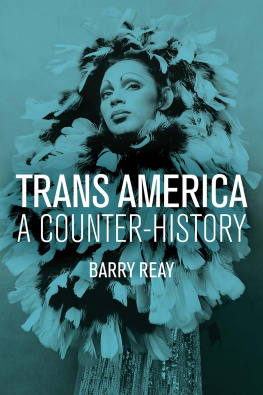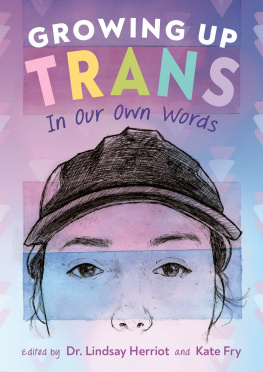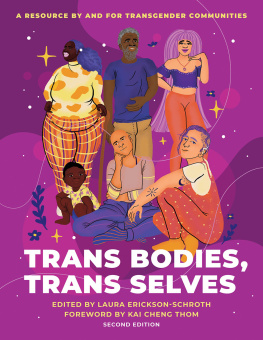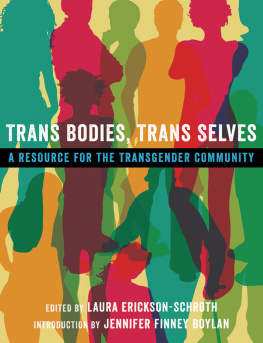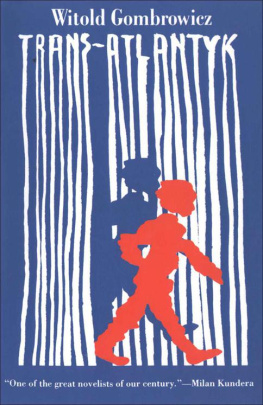Trans-Atlantyk
Trans-Atlantyk
An Alternate Translation
WITOLD GOMBROWICZ
TRANSLATED BY
DANUTA BORCHARDT


The Margellos World Republic of Letters is dedicated to making literary works from around the globe available in English through translation. It brings to the English-speaking world the work of leading poets, novelists, essayists, philosophers, and playwrights from Europe, Latin America, Africa, Asia, and the Middle East to stimulate international discourse and creative exchange.
Published with assistance from the Louis Stern Memorial Fund.
Copyright Czytelnik, Warsaw, 1957.
Copyright renewed Rita Gombrowicz, 2005.
English translation copyright Danuta Borchardt, 2014.
All rights reserved.
This book may not be reproduced, in whole or in part, including illustrations, in any form (beyond that copying permitted by Sections 107 and 108 of the U.S. Copyright Law and except by reviewers for the public press), without written permission from the publishers.
Yale University Press books may be purchased in quantity for educational, business, or promotional use. For information, please e-mail sales.press@yale.edu (U.S. office) or sales@yaleup.co.uk (U.K. office).
Set in Electra and Nobel type by Keystone Typesetting, Inc., Orwigsburg, Pennsylvania. Printed in the United States of America.
Library of Congress Cataloging-in-Publication Data
Gombrowicz, Witold.
[Trans-Atlantyk. English]
Trans-Atlantyk: an alternate translation / Witold Gombrowicz ; Translated by Danuta Borchardt.
pages cm.(The Margellos World Republic of Letters)
ISBN 978-0-300-17530-1 (pbk. : alk. paper) 1. Gombrowicz, WitoldFiction. 2. Polish peopleArgentinaHistoryFiction. I. Borchardt, Danuta, 1930, translator. II. Title.
PG7158.G669T713 2014
891.853dc23
2013020792
A catalogue record for this book is available from the British Library.
This paper meets the requirements of ANSI/NISO Z39.48-1992 (Permanence of Paper).
10 9 8 7 6 5 4 3 2 1
CONTENTS
Preface to the 1957 Edition, by
Witold Gombrowicz
TRANSLATORS NOTE
Witold Gombrowicz deemed Trans-Atlantyk his most untranslatable work, and it will always be a great challenge to any translator. When I read Carolyn French and Nina Karsovs translation, I felt that another attempt was justified. Perusing the analysis of the complex internal structure of his language by Ewa Sawkowa, a Gombrowicz scholar, was indeed discouraging, but Stanisaw Baraczak, another major modern scholar, described it as a masterpiece of twentieth-century fiction and one of the most dazzlingly original works in all of Polish literature. I could not resist such a challenge.
As an already renowned author, Gombrowicz was invited to a cruise on an ocean liners maiden voyage from Poland to Buenos Aires. A few days after the ship docked, at the end of August 1939, World War II broke out. Gombrowicz decided to stay in Argentina and lived there for the next twenty-three years rather than return to Europe. Often penniless or working on a meager salary as a bank clerk, he wrote his Diary, plays, and novels. Thus Trans-Atlantyk was written in Argentina and published serially in 1953 in the literary journal Kultura, then revised by the author in 1957. My translation is of the 1957 version, rather than of the 1953 version used by French and Karsov.
Trans-Atlantyk is probably Gombrowiczs most iconoclastic novel. It tells the individual and society (not only Polish, but society in general) to rise above its moresnationalistic, patriotic, sexualand to liberate itself from its societal manners and constraints.
Do not be just a Pole, be a human being free of all these encumbrances: this is one of his messages. Another, also directed at Poles, is a reprimand for their two-centuries-old martyrlike stance that began with the Partitions of Poland in the late 1700s. Gombrowicz does not let the nation off the hook: there were political events engendered by Poles themselves that led to that tragedy. Gombrowicz does not seem to be moved by the innocent victim notion. Is it a wonder then, that he chose the Polish gawda, a fireside chat, in its mostly anachronistic version, as his stylistic mode? If it was meant as a distancing device to save him from being crucified by his compatriots, it worked, but only partially.
His third, tongue-in-cheek, message has a more universal portent: issues between individuals and nations can be so horrific that nothing but humungous laughter may deliver salvation.
Historically, the gawda was a tale, a mode of interaction at social gatherings of the sixteenth- to nineteenth-century Sarmatian Polish nobility in their country manors. This was reflected in seventeenth-century Polish literature and has persisted in some twentieth-century writings, as well as in fireside social gatherings. I have been unable to find an equivalent to the gawda style in American literature.
In order to transpose, as faithfully as possible, Gombrowiczs style, I have made an attempt to educate myself in English from roughly the same time period during which the gawda thrived. I have studied the vocabulary and the rhythms of earlier English, especially by reading the works of Jonathan Swift, Laurence Sterne, and Herman Melville.
Trans-Atlantyk is a tale spoken mostly in baroque Polish and written in the first person. Even though not autobiographical, it relates the anxiety of the narratorand, by implication, of the authorabout the fate of his family and friends during the war raging in Poland. The narrator has encounters with the Polish envoy in Buenos Aires, with half-witted Polish industrialists, with a rich Argentinean homosexual, with a retired Polish army major and his son whom the Argentinean wants to seduce. Consistent with the authors philosophy of struggle between the constraint of Form and the pitfalls of Chaos, Gombrowicz plunges the reader into both.
In Gombrowiczs gawda, the narrator chats directly with his listeners. Spoken mostly in the past tense, the narrative often revertsawkwardly to the English-speakers earto the present tense, thus insinuating the narrator into the present and among his listeners.
A translation needs to convey, through the use of colloquialisms, an informal mode. The narrative has to flow quickly, easily. Yet it must also preserve the authors use of repetition and other rhetorical devices, as well as simulating as effectively as possible the beautiful lyrical passages that elevate the narrators spoken tale into a written work of art.
For further guidance into the language I went to the author himself, who wrote to his friend Dominique de Roux: This Trans-Atlantyk always makes me laugh... It frolics without restraint, it is sclerotic, absurd, in the gawda-style from one hundred years ago but mixed with another class of words, often with words invented by me. Gombrowiczs sclerotic denotes the rigidity, the hardening of our modern-day ideas, our behavior, the mores that he is fighting against. The message for me as the translator is to maintain this rigidity by forgoing any fancy rendition of the Polish (except where Gombrowiczs inventions make it necessary), instead adhering to well-worn expressions and idioms in English.
In order to convey the archaic language appropriate to the gawda, Gombrowicz uses expressions and rhetorical devices typical of eighteenth- and nineteenth-century Polish. For example, he sometimes reverses expected sentence order, suspending the verb until the end of a clause. I have infrequently encountered such reversals in, say, Swift, and have used them in my rendering of Gombrowiczs reversals only to the extent that they worked well in English. Gombrowicz also mimics the broader and more idiosyncratic use of uppercase letters common to earlier texts (in English as well), though he uses this device more sparingly in his 1957 version than in 1953. He also employs archaic orthographyspelling
Next page

